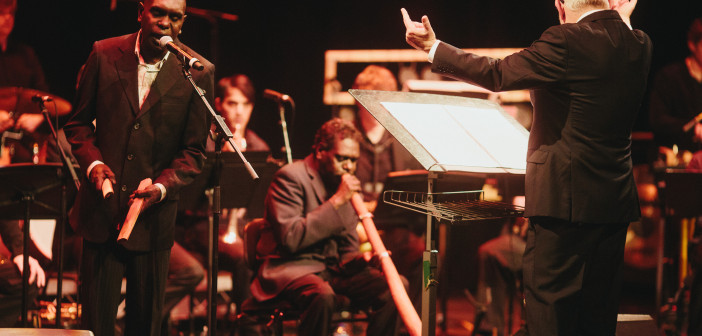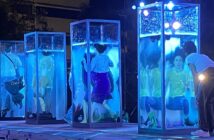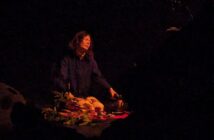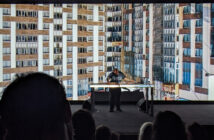It’s a peculiar combination. The Young Wagilak Group from South East Arnhem land and Paul Grabowsky conducting students from the Monash Art Ensemble as well as members of the Australian Orchestra. Traditions that are worlds apart.
They’re presenting Niyilipidgi, a series of suites, composed by Grabowsky based around the traditional songs of the Young Wagilak Group. The 16 strong ensemble, encompassing percussion, woodwind, brass, strings, piano, bass and even electronics stride onto stage and ready themselves as Daniel and David Wilfred on clap sticks and didgeridoo from the Young Wagilak Group are joined by Grabowsky. Grabowsky begins by stating that he’s known the brothers and their families for 10 years.
The electrics begin, field recordings, skittery twitchy violin scratching as the orchestra builds up, offering the kind of avant garde modern composition you might expect. But the moment that Daniel Wilfred opens his mouth everything changes. His voice is remarkable, singing in language, yet it’s his upper register wail that just cuts through everything. And it’s the relationship between the Young Wagilak’s music and Grabowsky’s compositions that provide a continual fascination for the remainder of the night.
Rhythmically it can be a square peg in a round hole, yet even the discomfort is fascinating, the key being the transitions between the two worlds. Sometimes hackneyed, ill fitting and Fanshawesque, at other times complete almost subliminal genius. Grabowsky resists the temptation to repeatedly use the ensemble to replicate the melodies of Wilfred’s voice, despite the fact that when he does it it’s very successful, transforming the orchestra into something new, something innovative, something ramshackle and beautiful. But throughout the hour and a half piece the relationship between the worlds constantly shift. Sometimes Grabowsky builds a crescendo, only to provide the Wilfred brothers an entrance, at other times Wilfred struggles to make his voice heard beneath the clatter of the orchestra at full tilt.
The highlight though is when the orchestra is subtle; slaving to the brothers as there’s a power in the traditional songs, a power, even perhaps a timbre that the orchestra could never hope to replicate. Yet throughout it’s impossible to shake the sheer improbability of this collaboration, not just culturally, but musically, and it’s the sheer audaciousness of this undertaking that makes it so successful. It’s perhaps best articulated during a moment midway when David Wilfred is absently tapping his didgeridoo while the orchestra is playing, seated, he dances using only his his legs, all suave and stylish, mixing the ballroom with his traditional dance extravagantly flicking out his heels in unison, an unselfconscious smile spreads across his face as he is lost in the moment, lost in the music.
Photo credit: Laki Sideris




